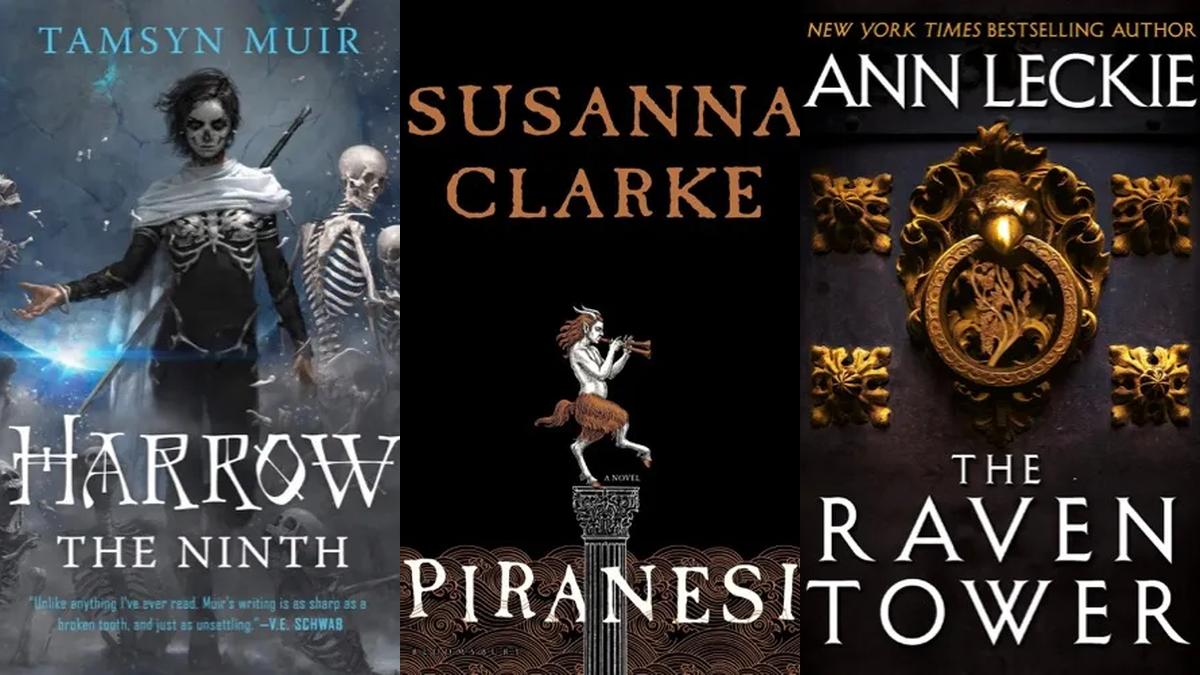
Tired of self-appointed “chosen ones” narrating their great deeds to you in a never-ending slog of self importance? Sick of listening to nerdy scientists blather on about metaphysical concepts you barely understand? Or maybe you’re just done with the regular-degular “just like you” narrator, a “relatable person” who’s blander than wheat bread rinsed with hot water? Sounds like you need a little bit of narrative spice. Some POV pizazz. The inner monologue of a deeply unusual mind. When it comes to narrative oddballs, these novels have you covered. Here are 10 sci-fi and fantasy books with the strangest narrators.
The Raven Tower
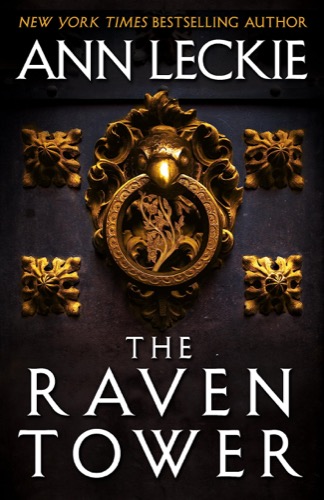
The Raven Tower by Ann Leckie is a rock solid addition to this list, considering that its main narrator is a literal rock. Well, a god inside of a rock. The Strength and Patience of the Hill is a divinity housed within a large boulder – essentially Patrick Star if he was nigh-omniscient and ageless, but still lived in his Bikini Bottom rock abode. Being a rock, Strength and Patience has seen a lot, witnessing the history of the world in unfathomable stretches of geological time – millions, even billions of years. Ol’ S&P was ancient when humanity was still crawling out of their caves, and has been around to see mankind make deals with divinities and form kingdoms. Strength and Patience bears witness to one such deal gone wrong – one of mankind’s kingdoms has struck a protection bargain with a raven god, but that deal goes off the rails when the raven god’s chosen emissary abruptly disappears. Humanity is scrambling to track the deserter town, but Strength and Patience is unhurried – it has all the time in the world. Literally.
Harrow The Ninth
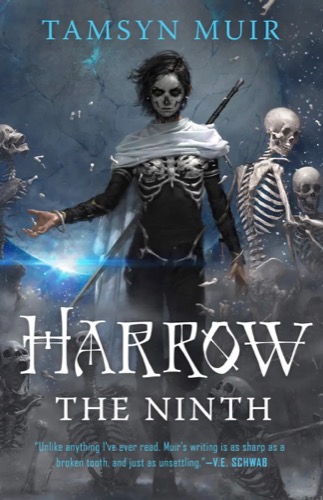
Tamsyn Muir already broke the fantasy narrator mould with Gideon the Ninth – told by a foul mouthed soldier with a penchant for making butt jokes. It’s irreverent, vulgar, and gloriously funny. For the second installment of spacefaring The Locked Tomb series, Muir decided to throw this narrative style out the airlock to make room for another literary conceit. Harrow The Ninth is narrated entirely in the second person, but not in a pretentiously literary “the author talking directly to you” sort of way. As the novel goes on, we begin to understand that the narrator is a separate voice inside the mind of its main character – necromancer Harrow The Ninth. As Harrow’s tenuous grip on reality slips while serving an undead space emperor (long story), this other inhabitant on her mind tethers her to herself. It’s like if your bestie lived in your brain and gave you positive encouragement! Wouldn’t that be nice?
Piranesi

Susanna Clarke’s Piranesi is narrated by a man who lost all his marbles – they went rolling down the labyrinthine hallways of the mansion calls home. The square footage of Piranesi’s abode would color any New York City apartment dweller neon green with envy – it’s large enough to contain entire oceans. The amnesiac Piranesi doesn’t remember how he got there, or how he can possibly afford to pay rent – his only concern is his work: cataloguing the house’s intricacies at the behest of a mysterious man known as The Other. The Other assures Piranesi that his work, however enigmatic and useless it seems, is of the utmost importance. All in all, this novel is the story of a fractured mind on a journey to find the truth of his existence – by following one winding corridor at a time.
Annihilation

Annihilation by Jeff VanderMeer is a cosmic horror story about mankind’s oldest foe: the environment. Mother Nature has just let in an alien visitor, and a pristine stretch of Earth’s wilderness is now being overtaken by an anomaly dubbed “Area X.” The research facility tasked with containing the anomaly is out of good ideas – so they just keep throwing waves of personnel over Area X’s shimmering border and hoping for the best. The newest task force sent into the anomaly is joined by an unnamed biologist, who serves as the novel’s unreliable narrator. As she and her team explore the alien environment, things turn from mundane to surreal on a dime. What’s reality and what’s hallucination? Where does the natural end and the unnatural begin? Does Area X only warp the perceptions of those who cross into it, or does it change the very structure of their minds?
Flowers For Algernon
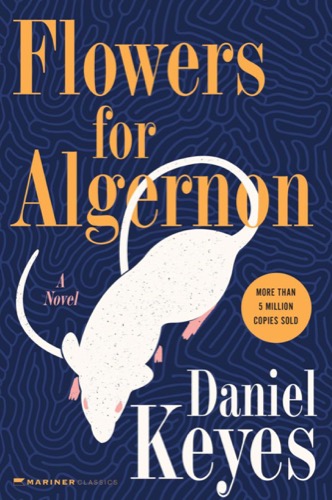
Flowers For Algernon by Daniel Keyes has an absolutely singular narrator – a man who experiences something that no other human has before. Before agreeing to serve as a test subject for an experiment on human intelligence, Charlie Gordon was a janitor with an IQ of 68. After the procedure, Charlie’s intellect begins to skyrocket, and he details this journey in his journals. Suddenly capable of grasping concepts far beyond the reach of the average mind, Charlie devotes his life to the pursuit of the knowledge. His quest is short lived. Unbeknownst to him, the effects of the procedure are temporary, and his lofty intelligence will soon come crashing back down to what it was before. It’s a throughly moving, utterly tragic read about a man who stands at the pinnacle of human understanding, only to be forced to climb back down.
Riddley Walker

Riddley Walker by Russell Hoban is equal parts engrossing and maddening. Written phonetically in a far-future version of the English language, the novel follows young Riddley throughout his life, lived two thousand years after the nuclear apocalypse. Riddley and his follow survivors live in “Inland” – an isolated island formerly known as Great Britain. It’s a simple world – an Iron Age society where church and state have fused into one, and morality is taught to the populace via puppet shows. The difficulty and charm of the novel lies in its narration, which is told in a language almost but not quite like modern English. Essentially, it’s a post-apocalyptic novel that’s entirely committed to the bit. You didn’t expect people to talk the same way as we do now after rebuilding society two millennia in the future, did you?
Engine Summer

Another post-apocalyptic romp, John Crowley’s Engine Summer is a soft sci-fi centered around a young man named “Rush that Speaks,” who serves as the narrator. Rush is recording his story into a futuristic recording device made out of crystal, which he intends to leave behind for posterity. In this future world, speaking is a spiritual act, and the community that Rush belongs to has perfected the art of “truthful speaking” – perfect, clear communication free of all deception. While Rush was previously dedicated to its study, he leaves his community behind to seek out a lost love, a woman who joined a mysterious society called Dr. Boots’s List. It’s a story about storytellers, where spinning yarns serves as the path to spiritual enlightenment. Weird, whimsical, inexplicably holy – this novel and its narrator are one of a kind.
Galápagos
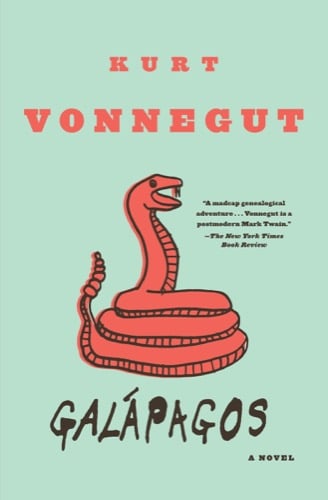
One of Kurt Vonnegut’s lesser known works, this speculative sci-fi is narrated by a million years dead ghost. The story of Galápagos is told by Leon Trotsky Trout, a spectral Vietnam veteran who died while building a luxury cruise ship. After the world is shaken by a series of apocalyptic tragedies, Leon tells the tale of how a small group of humans commandeered the cruise ship to settle on the islands, later evolving into a species of non-sentient seal creatures after eons. Wryly funny and wistfully sad, Galápagos is a satirical lament for the human condition. Our bodies learned to survive in a hostile future, but we left our brains behind – and now there’s no one alive left to see.
Children of Time
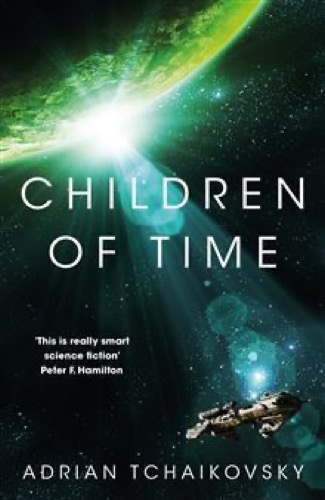
Children of Time by Adrian Tchaikovsky begins at the end of the world – humanity is packing up to leave a dying Earth behind. After a group of colonists touch down on a terraformed planet, they’re shocked to discover that another civilization has already set up shop. Due to a miscalculation in the terraforming process, the primates of this garden world died out, and intelligent spiders took their place at the top of the food chain. Swathes of the novel are narrated by these empathetic arachnids, whose kind and cooperative spirit causes them to treat other life forms more humanely than humans themselves. Ultimately, humanity proves itself to be the violent alien invaders, but the spiders accept us with eight arms open anyway.
The Devourers

The Devourers by Indra Nas is the story of Alok Mukherjee, a college professor in Kolkata who is gifted a collection of scrolls bound in human skin by a shapeshifter – how thoughtful! Alok isn’t the interesting POV character here, that honor belongs to the writers of the scrolls – werewolf lovers that devoured their way through India’s distant past. These human/lupine predators recount their lurid tales of murder like a trip to the grocery store – horrifying violence told with a casual air. As the werewolves consume more and more victims, their sense of self begins to blur – they don’t just eat human flesh, but human souls as well. As the werewolf lovers absorb of the memories of their meals, they begin to feel a shift within their minds, and Alok, taking all this in, starts feeling a shift in his own.
Have a tip we should know? [email protected]







